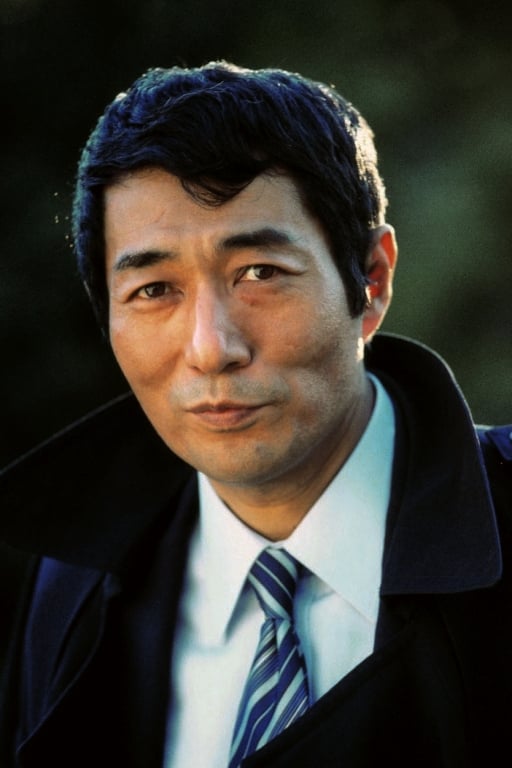
Shūji Terayama
Biography
From Wikipedia, the free encyclopedia.
Shūji Terayama (December 10, 1935 – May 4, 1983) was an avant-garde Japanese poet, dramatist, writer, film director, and photographer. According to many critics and supporters, he was one of the most productive and provocative creative artists to come out of Japan. He was born December 10, 1935, the only son of Hachiro and Hatsu Terayama in Hirosaki city in the northern Japanese prefecture of Aomori. His father died at the end of Pacific War in Indonesia in September 1945. At the age of nine, his mother moved to Kyūshū to work at an American military base while he himself went to live with relatives in the city of Misawa, also in Aomori. At this same time, Terayama lived through the Aomori air raids that killed more than 30,000 people.
Terayama entered Aomori Prefectural Aomori High School in 1951, and in 1954 went to prestigious Waseda University's Faculty of Education to study Japanese language and literature. However, he soon dropped out because he fell ill with nephrotic syndrome. He received his education through working in bars in Shinjuku. His oeuvre includes a number of essays claiming that more can be learned about life through boxing and horse racing than by attending school and studying hard. Accordingly, he was one of the central figures of the "runaway" movement in Japan in the late 1960s, as depicted in his book, play, and film "Throw Away Your Books, Run into the Streets!
In 1967, Terayama formed the Tenjō Sajiki theater troupe, whose name comes from the Japanese translation of the 1945 Marcel Carné film "Les Enfants du Paradis", so can be translated as "children of heaven", however its correct translation is "Ceiling Gallery" and has a meaning similar to the English expression "Peanut Gallery". The troupe was dedicated to the avant-garde and staged a number of controversial plays tackling social issues from an iconoclastic perspective. Some major plays include "Bluebeard", "Yes", and "The Crime of Fatso Oyama", among others. Also involved with the theater were artists Aquirax Uno and Tadanori Yokoo, who designed many of the advertisement posters for the group. Musically, he worked closely with experimental composer J.A. Seazer and folk musician Kan Mikami.
He was also involved in poetry and at 18 was the second winner of the Tanka Studies Award.
Terayama experimented with ‘city plays’, a fantastical satire of civic life.
Also in 1967, Terayama started an experimental cinema and gallery called 'Universal Gravitation,' which is in fact still in existence at Misawa as a resource center. The Terayama Shūji Memorial Hall, which has a large collection of his plays, novels, poetry, photography and a great number of his personal effects and relics from his theatre productions, can also be found in Misawa. In 1976, he was a member of the jury at the 26th Berlin International Film Festival.
Terayama published almost 200 literary works, and over 20 short and full-length films.
He was married to Tenjō Sajiki co-founder Kyōko Kujō, but they later divorced, although they continued to work together until Terayama's death on May 4, 1983 from cirrhosis of the liver.
Description above from the Wikipedia article Shūji Terayama, licensed under CC-BY-SA, full list of contributors on Wikipedia
Known For
Personal Info
Known For
Directing
Known Credits
86
Gender
Male
Birthday
1935-12-10 (89 years old)
Place of Birth
Aomori, Japan
Acting
2017
Where is Tomorrow, Shuji Terayama as Himself (archive footage)1983
Video Letter as Self1978
Children of the Gods as Himself1977
Catalog of Memory as himself1973
JRA CM as Himself1966
Pretty Devil Yoko as ImuraCrew
2021
海王星 Creator2017
Ah, Wilderness: Part 1 Novel2017
Ah, Wilderness: Part 2 Novel2013
Lemming Writer1994
On the Far Side of Twilight Original Story1993
The Experimental Image World of Shuji Terayama Director1993
The Experimental Image World of Shuji Terayama Writer1984
Farewell to the Ark Director1984
Our Age Comes Riding on a Circus Elephant Writer1984
Farewell to the Ark Screenplay1983
The Lemmings Director1983
La Marie-vison Writer1983
The Hunchback of Aomori Writer1983
Video Letter Cinematography1983
Video Letter Editor1983
Video Letter Writer1983
Video Letter Director1983
The Lemmings Writer1981
Fruits of Passion Director1981
100 Years of Solitude Director1981
Fruits of Passion Writer1980
A Tale of Africa Writer1979
Private Collections Director1979
Grass Labyrinth Director1979
Grass Labyrinth Screenplay1979
Private Collections Screenplay1978
Les chants de Maldoror Director1978
An Attempt to Describe the Measure of a Man Director1978
An Attempt to Describe the Measure of a Man Screenplay1978
Shintokumaru Director1978
Directions to Servants Director1978
Third Base Writer1978
Les chants de Maldoror Writer1978
Shintokumaru Writer1978
Directions to Servants Writer1977
Father Director1977
The Eraser Director1977
The Eraser Screenplay1977
The Woman with Two Heads Screenplay1977
The Woman with Two Heads Director1977
The Reading Machine Screenplay1977
The Reading Machine Director1977
Boxer Director1977
Boxer Screenplay1975
Labyrinth Tale Director1975
Smallpox Tale Director1975
Smallpox Tale Screenplay1975
The Trial Director1975
The Trial Screenplay1975
Labyrinth Tale Script1974
Pastoral: To Die in the Country Writer1974
Pastoral: To Die in the Country Producer1974
Pastoral: To Die in the Country Director1974
Butterfly Director1974
Butterfly Writer1974
Young Person's Guide to Cinema Director1974
Laura Director1974
Young Person's Guide to Cinema Screenplay1973
JRA CM Director1971
Emperor Tomato Ketchup Writer1971
Emperor Tomato Ketchup Editor1971
Emperor Tomato Ketchup Music1971
Emperor Tomato Ketchup Director1971
Throw Away Your Books, Rally in the Streets Producer1971
The War of Jan-Ken-Pon Director1971
Throw Away Your Books, Rally in the Streets Director1971
Throw Away Your Books, Rally in the Streets Writer1971
The War of Jan-Ken-Pon Writer1970
The Scandalous Adventures of Buraikan Writer1970
Tomorrow's Joe Lyricist1968
Nanami: The Inferno of First Love Writer1967
Mothers Poem1964
The Cage Director1964
The Cage Screenplay1962
A Flame at the Pier Screenplay1961
Killers on Parade Writer1961
Epitaph to My Love Screenplay1960
Catology Director1960
Get 'em All Screenplay1960
Youth in Fury Screenplay